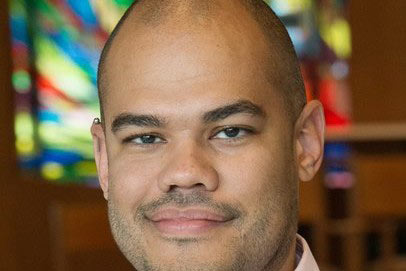Marvin Wickware: moving beyond reconciliation

“I don’t use the term ‘racial reconciliation’ much anymore,” said Marvin Wickware, assistant professor of church and society and ethics, “because it’s lifted up as an alternative to anti-racism these days.” And for Wickware, working towards an antiracist church and society is the crucial opportunity in this moment in history: finding ways to boldly understand love differently, to understand the concept of enemies differently, and to move forward together into a future that challenges structures and systems that owe their existence to entrenched inequity.
It’s a tall order. Wickware is the first to acknowledge that “usually what ‘loving the enemy’ involves [in a Christian context] is somebody telling an angry BIPOC person, ‘you need to be more forgiving.’ That’s usually where that actually goes.” Wickware is not interested in that expression or understanding of enmity. Rather, he is interested in, as he said, “understanding the difference between the personal and the structural enemy.”
Wickware seeks to work with individuals and communities to develop their resilience in the face of difficult conversations and realizations about the reality of systemic racism in the United States. Sometimes this project is harder than others, especially in the face of white culture’s denial, refusal to engage, or intractable defensiveness.
Wickware is no stranger to the realities of white fragility in public and religious spaces. He points to an experience he had as an elder at a church that was explicitly committed to racial reconciliation where a Black intern’s sermon that characterized the United States’ problem with white supremacy as a national addiction in the wake of the Mother Emanuel AME Church mass shooting was met with complaints rooted in white listeners’ personal discomfort.
“What is racial reconciliation work in church even doing if it’s not getting people to the point where they can hear basic critique?” Wickware asks. “I think the backbone of any anti-racist work is developing the emotional and spiritual capacity to manage conflict and manage being critiqued.” Developing this higher degree of capacity to engage with conflict and tension is one thing that Wickware teaches at LSTC, in the hopes that his students will take what they’ve learned in the classroom and apply it to larger projects.
“It’s lovely if people in a church can understand each other better and be friends with each other, but what’s needed is for churches to take the moral authority they have in some quarters and the regular access they have to elected officials and all kinds of systems of influence and use those towards radical political ends,” Wickware says.
Involvement with The People’s Lobby, an organizing group which was heavily involved in the passage of the Pre-Trial Fairness Act here in Illinois, and specifically with the Faith Liberation Movement of the People’s Lobby, represents one way he does what he encourages others to do: put their faith into action and demonstrate their love for others by first acknowledging their own place in a system marked by inequity and then agitating for political changes.
“We need to transform our entire society,” Wickware says. “We need to radically change the way we relate to the world around us.”
By Rhiannon Koehler, a writer, editor and content director in Chicago.